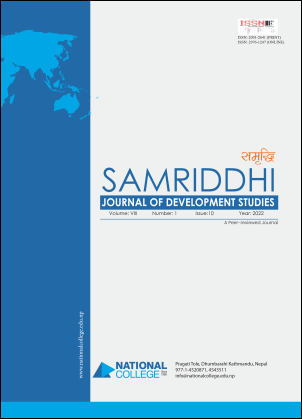Effectiveness of Rural Cooperatives as Means to Enhance Conservation through Economic Development
DOI:
https://doi.org/10.3126/sjds.v8i1.60981Keywords:
poverty, environment conservation, natural resources, livelihood, micro financing, financial cooperativesAbstract
Most of the protected areas, mainly in developing countries and least developed countries (LDCs), are surrounded by people with poor livelihood and economic conditions that often tend to encroach the forest resources. Previous studies have found that community having poor access or absence of alternative means often becomes susceptible to a vulnerability that may further deteriorate their livelihood conditions making conservation activity more difficult. Since conservation is always challenging without the cooperation of the surrounding communities, it is thus important to make them more responsive about conservation which is possible if they are socioeconomically self-reliant. As the success of conservation is associated with the surrounding communities’ livelihood conditions, this study tries to understand the role of a grassroot organization like cooperatives on enhancing the prospective factors and overcoming constraints associated with the conservation.
The study conducted 23 in-depth interviews, focus group discussions (FGDs) and observations. These respondents were selected through snowball sampling method. Focus group discussions were done between the shareholders/members of Shree Dhampus Agriculture Development Cooperative Limited and the manager of the same cooperative.
One of the main factors that influenced people’s attitudes toward practicing environmentally friendly activities was the financial factor. Due to the financial literacy gained from the local cooperative, people have realized the importance of money which led them to financially evaluate whether to use cooking gas or forest resources. However, limited cooperative educations still obstructs people from realizing the importance of benefits they can derive from cooperatives as well as from the conservation of the environment. Nonetheless, the study concludes that despite various constraints, a good example and potential of clustering was seen at the study site. Clustering not only has helped the big companies in the study site but also was able to build the network among the same types of firms. This clustering of firms and the ‘we’ feeling induced through cooperative can be positively used to promote conservation and protection of wildlife and biodiversity.




